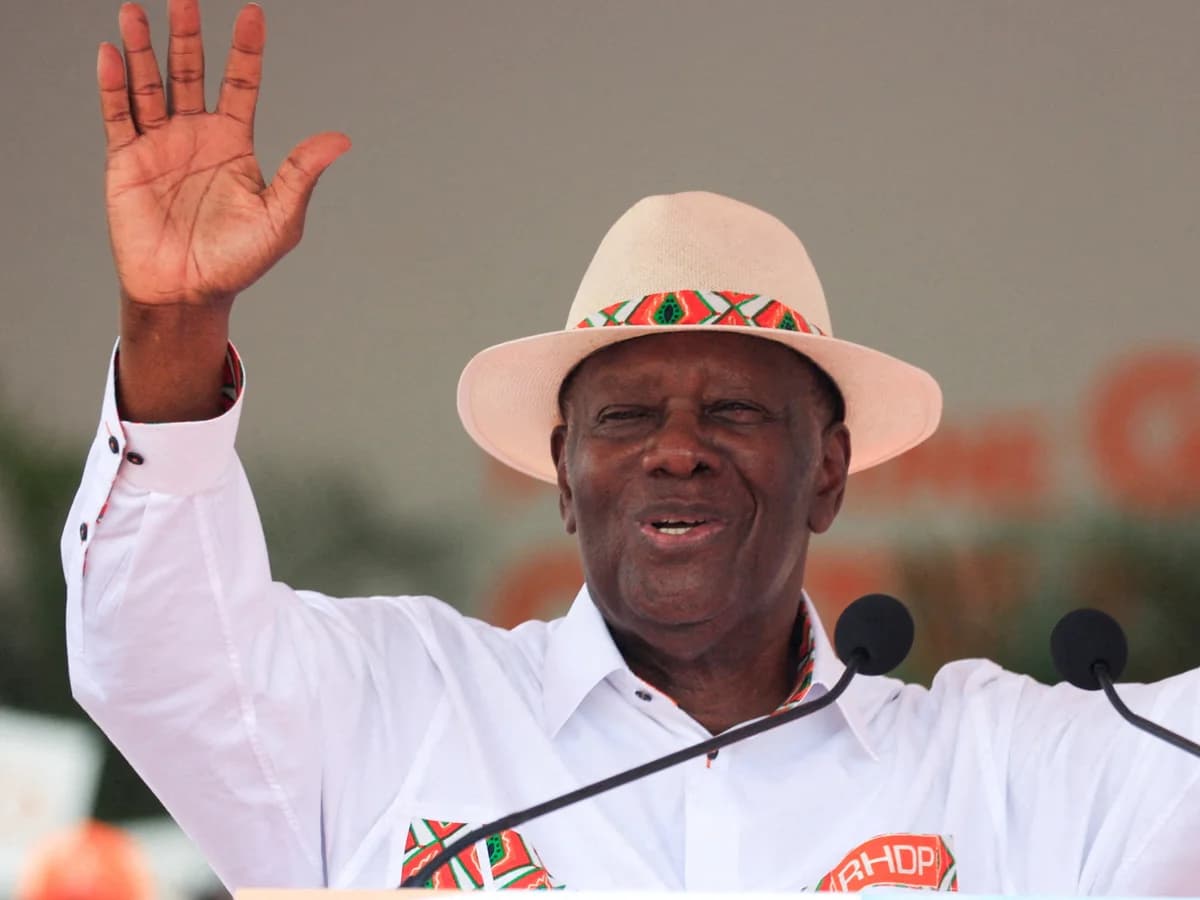We're loading the full news article for you. This includes the article content, images, author information, and related articles.
President Alassane Ouattara’s landslide victory, following the exclusion of key rivals, raises questions about democratic stability in West Africa, a region of growing economic importance for Kenya.

ABIDJAN, IVORY COAST – President Alassane Ouattara, 83, has secured a controversial fourth term in office with a declared 89.8% of the vote, according to provisional results announced by the country's electoral commission on Monday, 27 October 2025. The election was marked by a low voter turnout of approximately 50.1% and an opposition boycott after two of the president's most significant challengers were barred from participating.
The victory was widely anticipated after former President Laurent Gbagbo and former Credit Suisse CEO Tidjane Thiam were disqualified from the presidential race. Gbagbo was excluded due to a prior criminal conviction, while Thiam was barred for previously holding dual nationality. In response, their parties urged supporters to boycott the vote, denouncing the process as a "civilian coup d'etat" and refusing to recognise Ouattara's legitimacy.
Businessman Jean-Louis Billon finished a distant second with 3.09% of the vote, while former First Lady Simone Gbagbo garnered 2.42%. The final results are pending confirmation by the Constitutional Council, which will rule on any electoral petitions.
President Ouattara's decision to seek a fourth term has been a major source of political tension. The Ivorian constitution imposes a two-term limit, but Ouattara has successfully argued that a 2016 constitutional referendum reset his term count to zero. This interpretation, which also enabled his third-term run in 2020, has been condemned by opposition figures as a "constitutional coup." The African Union and the regional bloc ECOWAS have been criticised for their perceived silence on such constitutional manoeuvres across the continent.
The political situation in Ivory Coast, West Africa's second-largest economy and the world's top cocoa producer, is watched closely for its potential impact on regional stability. The nation has a history of election-related violence, most notably the 2010-2011 crisis which resulted in over 3,000 deaths after Laurent Gbagbo refused to concede defeat to Ouattara. While the recent election was reported by observers from the ECOWAS-African Union mission as having occurred in a "calm and peaceful atmosphere," the pre-election period saw hundreds of opposition protesters arrested.
Since first assuming the presidency in 2011, Ouattara, a former senior official at the International Monetary Fund (IMF), has been credited with overseeing significant economic growth and stability. The country has experienced an average annual growth of over 7% since 2012, attracting foreign investment through major infrastructure projects. Supporters point to this record as a key justification for his continued leadership.
However, critics argue that the economic benefits have not been evenly distributed, with high rates of youth unemployment and poverty persisting. The disqualification of major opposition figures has led analysts to suggest that Ouattara's victory was secured through his strong influence over state institutions rather than a fully democratic mandate. This raises concerns about democratic backsliding in a region already grappling with a series of military coups.
While direct political ties between Kenya and Ivory Coast are developing, the election's outcome holds significance for Nairobi's strategic interests. Kenya has been actively working to expand its diplomatic and economic footprint in West Africa. In April 2024, the government vetted its first-ever ambassadorial nominee to Abidjan, signalling a clear intent to strengthen ties.
Trade between the two nations, though modest, is growing. In 2023, Kenyan exports to Ivory Coast, primarily tea and cut flowers, were valued at approximately $7.02 million, while imports from Ivory Coast, dominated by palm oil and cocoa products, stood at $20.8 million. A stable political environment in Ivory Coast is crucial for the continued growth of these trade links and for Kenyan businesses looking to invest in the Francophone market.
Furthermore, as a key player in the African Union, Kenya has a vested interest in the upholding of democratic norms and constitutionalism across the continent. The events in Abidjan contribute to a broader continental debate on presidential term limits and the health of democratic institutions, a conversation that resonates within the East African Community and beyond. The stability of a major regional economy like Ivory Coast can have ripple effects on investor confidence and security across Africa.
Keep the conversation in one place—threads here stay linked to the story and in the forums.
Other hot threads
E-sports and Gaming Community in Kenya
Active 8 months ago
The Role of Technology in Modern Agriculture (AgriTech)
Active 8 months ago
Popular Recreational Activities Across Counties
Active 8 months ago
Investing in Youth Sports Development Programs
Active 8 months ago
Key figures and persons of interest featured in this article